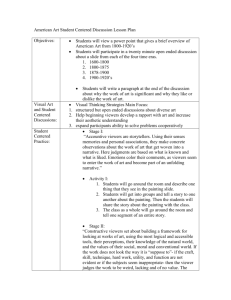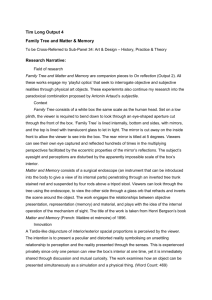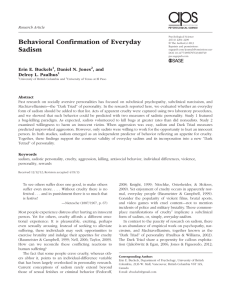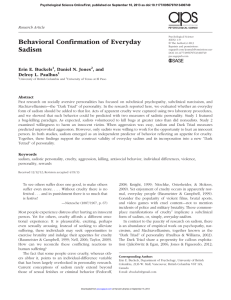The Success of Reality TV - Donald Guy`s WIP Project
advertisement
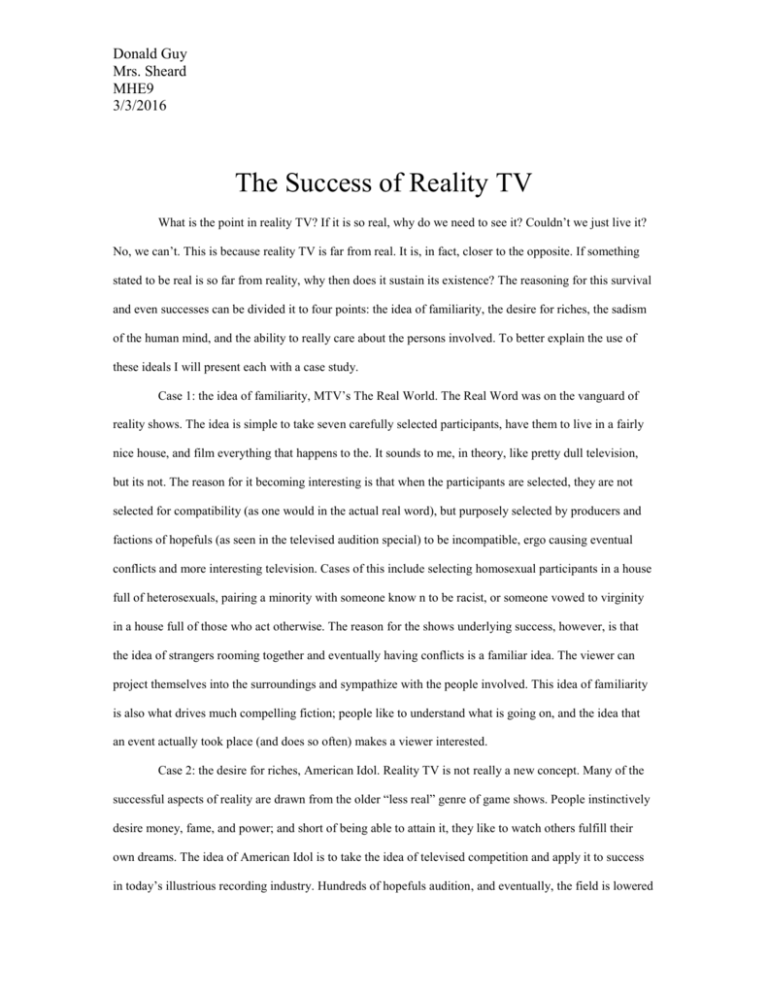
Donald Guy Mrs. Sheard MHE9 3/3/2016 The Success of Reality TV What is the point in reality TV? If it is so real, why do we need to see it? Couldn’t we just live it? No, we can’t. This is because reality TV is far from real. It is, in fact, closer to the opposite. If something stated to be real is so far from reality, why then does it sustain its existence? The reasoning for this survival and even successes can be divided it to four points: the idea of familiarity, the desire for riches, the sadism of the human mind, and the ability to really care about the persons involved. To better explain the use of these ideals I will present each with a case study. Case 1: the idea of familiarity, MTV’s The Real World. The Real Word was on the vanguard of reality shows. The idea is simple to take seven carefully selected participants, have them to live in a fairly nice house, and film everything that happens to the. It sounds to me, in theory, like pretty dull television, but its not. The reason for it becoming interesting is that when the participants are selected, they are not selected for compatibility (as one would in the actual real word), but purposely selected by producers and factions of hopefuls (as seen in the televised audition special) to be incompatible, ergo causing eventual conflicts and more interesting television. Cases of this include selecting homosexual participants in a house full of heterosexuals, pairing a minority with someone know n to be racist, or someone vowed to virginity in a house full of those who act otherwise. The reason for the shows underlying success, however, is that the idea of strangers rooming together and eventually having conflicts is a familiar idea. The viewer can project themselves into the surroundings and sympathize with the people involved. This idea of familiarity is also what drives much compelling fiction; people like to understand what is going on, and the idea that an event actually took place (and does so often) makes a viewer interested. Case 2: the desire for riches, American Idol. Reality TV is not really a new concept. Many of the successful aspects of reality are drawn from the older “less real” genre of game shows. People instinctively desire money, fame, and power; and short of being able to attain it, they like to watch others fulfill their own dreams. The idea of American Idol is to take the idea of televised competition and apply it to success in today’s illustrious recording industry. Hundreds of hopefuls audition, and eventually, the field is lowered Donald Guy 2 to twenty four semi finalists, and then to twelve finalists, who perform in competition and are ultimately eliminated one at a time, until only one remains. This person is declared the American Idol and given a recording contract and promotions. The appeal of this show is due to many aspects. In the beginning auditions, it is very much that of sadism; viewers like to see people fail horribly and be berated by the judges. This somehow adds to their own self-esteem. In the second and third portions the viewer’s like the feeling of control, being able to have a say (by voting) in who remains on the show and who leaves. In the third and final stage people begin to have feelings of loyalty for particular contestants and like to see them succeed. Ultimately the overall appeal can be attributed to viewers’ desire to be involved in the gaining of power. Case 3: the sadism of the human mind, Fear Factor. The idea of fear factor is to make people do things that they find frightening or disgusting in order to win $50,000 or on one special $1million. It is a fact of human nature that most people will do things they consider unpleasant in order to obtain a large sum of money, but why would people watch it? One argument to apply would be that of the prior paragraph, that people project themselves into the situation, fantasizing that they are winning the money. While this may be true for some people, the majority of people would only apply the self-projection ideal into a pleasant or neutral situation (though one might refute this argument with the success of horror movies, but that is beyond the scope of this essay). So, if very few viewers would like to actually be in the presented situation, what can explain its wide-spread successes? Somewhat oddly, the answer is the very fact that few viewers would actually like to be in the presented situation. People like to see people suffer. (Period.) While most people would refute this characteristic of themselves and some people genuinely don’t have it, the fact remains that the majority of the worlds population like to see, sometimes cause, suffering (although it usually excludes people that are personally liked by that person). I would put this sadism down as a manifestation of the ideal that by seeing situations he wouldn’t like to be in, a person feels better that he, personally, is not in that situation. Case 4: the ability to really care about the persons involved Beauty and the Geek. I picked this show because (somewhat sadly,) I can truly identify with many of the male participants on the show. The idea of the show is to take attractive, albeit fairly dumb women and put them on guy-girl teams with men like me, which is to say very intelligent, albeit kind of socially inept men. They are then forced to compete Donald Guy 3 in competitions against their specialties, intellectual challenges (such as a spelling bee) for the women and social challenges (such as a dance competition) for the men. The reason I find this show engaging is the simple fact that I can sympathize with the men on the show. I have been in similar situations and I feel sorry for them. I actually care how they do in the situations. As you can see from the arguments above there are many reasons why reality TV h as been successful. The facts are that in the end what reality TV does is interface with people at the base of human nature; it activates sadism, jealousy, compassion, empathy, and greed. While many, though not all, of these traits are considered to be amoral the truth is that these are emotions that everyone feels, and to relate to them is to relate to every human being; by relating to them, it interests them, and for most people, attracts them. So, to some it all up in what statement: the successes of reality TV is a result of its ability to relate to the human race on an innate level.
